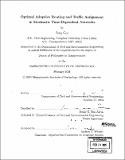Optimal adaptive routing and traffic assignment in stochastic time-dependent networks
Author(s)
Gao, Song, 1976-
DownloadFull printable version (10.99Mb)
Other Contributors
Massachusetts Institute of Technology. Dept. of Civil and Environmental Engineering.
Advisor
Moshe E. Ben-Akiva.
Terms of use
Metadata
Show full item recordAbstract
A stochastic time-dependent (STD) network is defined by treating all link travel times at all time periods as random variables, with possible time-wise and link-wise stochastic dependency. A routing policy is a decision rule which specifies what node to take next out of the current node based on the current time and online information. A formal framework is established for optimal routing policy problems in STD networks, including generic optimality conditions, and a comprehensive taxonomy with insights into variants of the problem. A variant pertinent to road traffic networks is studied in detail, where a discrete joint distribution of link travel times is used to accommodate the most general stochastic dependency among link travel times, and the access to perfect online information about link travel times is assumed. Both exact and approximation solution algorithms are designed and tested. The criteria of optimality are then extended to reliability measures, such as travel time variance and expected early/late schedule delays. The first routing-policy-based stochastic dynamic traffic assignment (DTA) model is established. A general framework is provided and the equilibrium problem is formulated as a fixed point problem with three components: the optimal routing policy generation module, the routing policy choice model and the policy-based dynamic network loader. An MSA (method of successive averages) heuristic is designed. Computational tests are carried out in a. hypothetical network, where random incidents are the source of stochasticity. The heuristic converges satisfactorily in the test network under the proposed test settings. The' adaptiveness in the routing policy based model leads to travel time savings at equilibrium. (cont.) As a byproduct, travel time reliability is also enhanced. The value of online information is an increasing function of the incident probability. Travel time savings are high when market penetrations are low. However, the function of travel time saving against market penetration is not monotonic. This suggests that in a travelers' information system or route guidance system, the information penetration needs to be chosen carefully to maximize benefits.
Description
Thesis (Ph. D.)--Massachusetts Institute of Technology, Dept. of Civil and Environmental Engineering, 2005. Includes bibliographical references (p. 233-237).
Date issued
2005Department
Massachusetts Institute of Technology. Department of Civil and Environmental EngineeringPublisher
Massachusetts Institute of Technology
Keywords
Civil and Environmental Engineering.